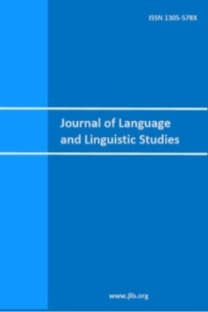Teaching English Through Literature
Bu makale günümüzde hem temel dil becerilerinin (okuma, yazma, dinleme ve konuşma) hem de dilalanlarının (sözcükbilgisi, dilbilgisi ve telaffuz) öğretiminde sevilen bir teknik olarak edebiyatın kullanımınıvurgulamayı amaçlamaktadır. Dil öğretmenlerinin edebi metinleri kullanmalarının ve seçmelerinin temelinioluşturan sebepleri ve ölçütleri okuyucuya tanıtmak amacıyla, yabancı dil sınıfında edebi metinlerkullanmanın sebepleri ve yabancı dil sınıflarında uygun edebi metinler seçmenin temel ölçütlerivurgulanmaktadır. Üstelik, edebiyat ve dil becerileri öğretimi, farklı edebiyat türlerinin (şiir, kısa öykü, dramave roman) dil öğretimine yararları ve edebiyat ile İngilizce öğretimi alanında dil öğretmenleri tarafındankarşılaşılan bazı sorunlar (TESL / TEFL programlarındaki edebiyat öğretimi alanındaki hazırlığın yetersizliği,ESL / EFL programlarında edebiyatın rolünü tanımlayan açık amaçların yokluğu, dil öğretmenlerinin edebiyattemeline ve eğitimine sahip olmayışı, dil öğretmenleri tarafından sınıf bağlamında kullanılabilecek eğitselolarak tasarlanmış uygun materyallerin yokluğu) ele alınıyor
Anahtar Kelimeler:
Edebiyat, Edebiyat Öğretimi, Dil Becerileri Öğretimi, Yabancı Dil Öğretimi, Edebi Yeti
This paper aims at emphasizing the use of literature as a popular technique for teaching both basic language skills (i.e. reading, writing, listening and speaking) and language areas (i.e. vocabulary, grammar and pronunciation) in our times. Reasons for using literary texts in foreign language classroom and main criteria for selecting suitable literary texts in foreign language classes are stressed so as to make the reader familiar with the underlying reasons and criteria for language teachers’ using and selecting literary texts. Moreover, literature and the teaching of language skills, benefits of different genres of literature (i.e. poetry, short fiction, drama and novel) to language teaching and some problems encountered by language teachers within the area of teaching English through literature (i.e. lack of preparation in the area of literature teaching in TESL / TEFL programs, absence of clear-cut objectives defining the role of literature in ESL / EFL, language teachers’ not having the background and training in literature, lack of pedagogically-designed appropriate materials that can be used by language teachers in a classroom context) are taken into account.
___
Arıoğul, S. 2001. “The Teaching of Reading Through Short Stories in Advanced Classes” Unpublished M.A Thesis. Ankara: Hacettepe University.Collie, J. and S. Slater. 1990. Literature in the Language Classroom: A Resource Book of Ideas and Activities. Cambridge: CUP.
Custodio, B. and M. Sutton. 1998. “Literature-Based ESL for Secondary School Students” in TESOL Journal. Vol 7, No.5, p.p: 19-23.
Çubukçu, F. 2001. “Use of Poetry for EFL Purposes.” (Unpublished Article). İzmir: Dokuz Eylül University.
Elliot, R. 1990. “Encouraging reader-response to literature in ESL situations” in ELT Journal. Vol 44, No. 3, p.p:191-198
Helton, C.A, J.Asamani and E.D.Thomas. 1998. “A ‘Novel’ Approach to the Teaching of Reading”. Tennessee State: Tennessee State University, p.p: 1-5, Available Internet Address: http: // www.nade.net / documents / SCP98 / SCP98.19.pdf
Hiller, J.P. 1983. “Teaching Poetry in the Foreign Language Classroom: Theory and Practice.” Unpublished PhD Dissertation. Stony Brook: State University of New York.
Lenore, K.L. 1993. The Creative Classroom A Guide for Using Creative Drama in Classroom. U.S.A.: Elsevier, Inc.
Maley, A. 1989. “Down from the Pedestal: Literature as Resource” in Literature and the Learner: Methodological Approaches. Cambridge: Modern English Publications.
Mengü, H.I. 2002. “A Suggested Syllabus for the Drama Teaching Course in ELT Departments”. Unpublished M.A Thesis. Ankara: Hacettepe University.
Obediat, M. 1997. “Language vs. Literature in English Departments in the Arab World” in English Teaching Forum.
Sage, H. 1987. Incorporating Literature in ESL Instruction. New Jersey: Prentice-Hall, Inc.
Saraç, S. 2003. “A Suggested Syllabus for the Teaching of Poetry Course in ELT Departments of Turkey” Unpublished M.A Thesis. Ankara: Hacettepe University.
Sarıçoban, A. 2004. “Using Drama in Teaching Turkish as a Foreign Language” in Eurasian Journal of Educational Research. No.14, p.p: 13-32.
Spack, R. 1985. “Literature, Reading, Writing, and ESL: Bridging the Gaps” in TESOL
Quarterly. Vol 19, No.4, p.p: 703-721.
Stern, S. 1991. “An Integrated Approach to Literature in ESL / EFL” in Teaching English as a Second or Foreign Language. ed. Murcia, M. Boston: Heinle & Heinle Publishers.
Murat Hişmanoğlu is an instructor at Ufuk University, English Preparatory School.
E-mail: hismanoglu@ufuk.edu.tr
- ISSN: 1305-578X
- Yayın Aralığı: Yılda 4 Sayı
- Yayıncı: Hacettepe Üniversitesi
Sayıdaki Diğer Makaleler
Palatalization in English: An Articulation Problem for Turkish Teacher Trainees
Motivation and Student Perception of Studying in an English-medium University
Classroom Management Skills of the Language Teachers
Barbie Against Superman: Gender Stereotypes and Gender Equity in the Classroom
Yabancı Dil Öğretiminde İletişimsel Yeti
Teaching English Through Literature
Türkçe’nin Yabancı Dil Olarak Öğretilmesi
The Effect of Native Speaker Teachers of English on the Attitudes and Achievement of Learners
İletişim Ve Dil: Yöntemler, Avrupa Dil Portföyü Türkçenin Yabancı Dil Olarak Öğretimi
Yılmaz Erdoğan'ın "Keşke" Öyküsü Ve Söylem Biçembilimi: Bir Yöntem Ve Uygulama
